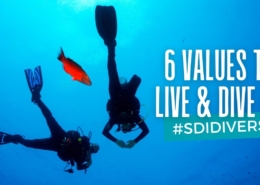Divemaster Briefings: 3 ways listening in can actually benefit your dive
by Leah Potts:
In the midst of the excitement and anticipation that surrounds a day of diving, we can sometimes forget about the boat crew whose job is to safely enhance our dive experience. Here are a few ways remembering to pay attention to the crew’s briefings can make your dive easier, safer, and more enjoyable:
- Knowing the boat you’re on.
The divemaster or captain typically gives a short briefing just as the boat leaves the dock. This briefing gives you the knowledge you need for a safer and more enjoyable ride to the dive site. It includes basic information about the boat such as the location of the head, where lifejackets are stored, where to keep your personal gear, and what parts of the boat are open to passengers. This talk may also include information about travel time and transit conditions. Paying attention could save you the embarrassment of being reprimanded by the captain after trying to access the off-limits bow en route, or from the danger of donning your exposure protection suit only five minutes into an hour long trip and overheating. If the briefing emphasizes that transit conditions will be particularly rough, you will be able to double check that your equipment is properly stored ahead of time, preventing dive-ending broken gear or injuries.
- Knowing how to navigate the dive.
Once the boat has arrived at the site, the divemaster usually gives another briefing focusing on the dive itself. Listening carefully to this briefing can make getting in and out of the water easier, help you see more on your dive, and keep you from getting lost. Navigating from your seat on the bench and into the water while wearing heavy gear can be difficult, especially in rough conditions; standing up prematurely could lead to discomfort or injury. Listening to how and when to make your way to the water could greatly reduce your pre-dive stress and increase comfort, making your dive easier and more fun.
The briefing may also provide information about handling current speed and direction. If the divemaster specifies using a tag line, down line, or mooring line, listen closely as this will help you see more on your dive by making sure you actually reach the site instead of drifting off in the current. Paying attention to the briefing may also help you pick up handy tips such as what part of the reef is home to interesting sea creatures or where on a wreck is best for capturing a great picture. Finally, the divemaster briefing will include the most effective way to navigate the site and return safely to the boat. Listening to this can save you the embarrassment of having to be retrieved from a mile away after everyone else has finished their dive. On deeper wrecks and drift dives, the divemaster often accompanies customers underwater, guiding the dive and carrying extra gas in case of an out-of-air situation. Knowing who to follow and where extra gas is located makes your dive safer and more enjoyable.
- Knowing what to do in case of an emergency.
Emergencies sometimes happen, and knowing what to do in case of one not only enhances the safety of your dive but also gives you peace of mind. Listening closely to the divemaster’s briefing gives you information on how the boat handles lost buddy situations, severe weather, and health-related emergencies. Sometimes, boats use underwater recall sound systems to let divers know the type and severity of an emergency. Listening to the divemaster’s briefing about what various sounds mean will help you know how quickly you must end your dive in the event of an emergency, keeping you as safe as possible. Paying attention to this briefing will also help you learn how to signal the boat if you are having a problem. This knowledge will improve the safety of your dive and give you peace of mind that you have the tools to handle such a situation.
These are just a few ways that listening to the crew’s briefings can benefit your dive experience. Paying attention can give you crucial knowledge about boat procedures, dive site navigation, and emergency protocols that will enhance the safety and enjoyment of your dive. Because after all, that’s what diving is all about – having fun while staying safe.









Ответить
Хотите присоединиться к обсуждению?Не стесняйтесь вносить свой вклад!